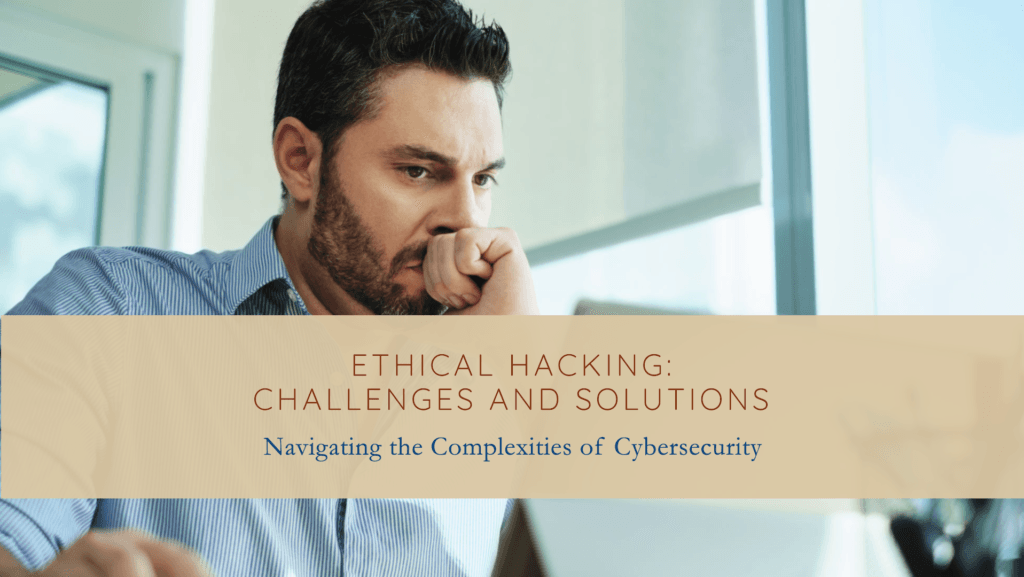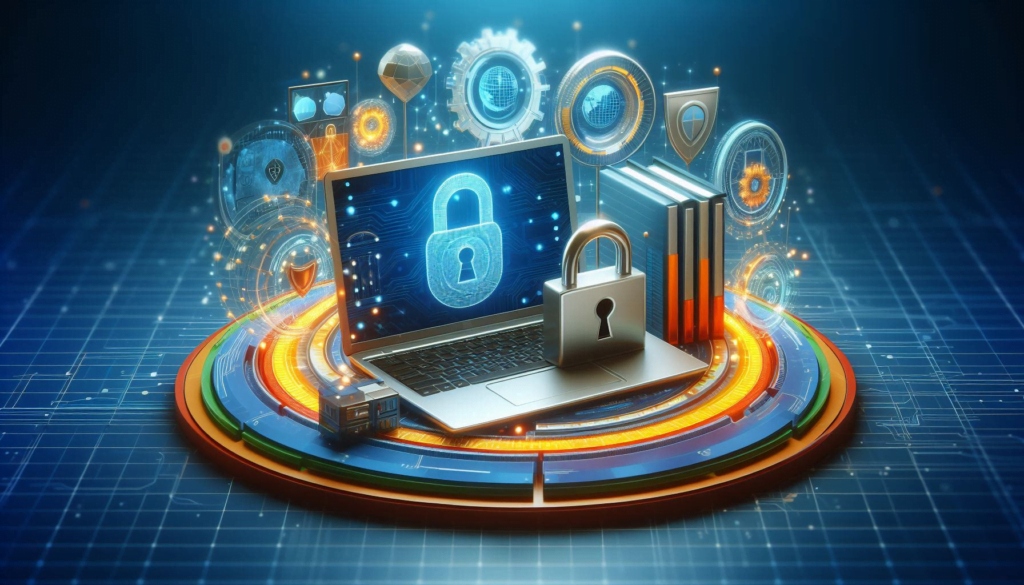Welcome to Technology Moment, your go-to hub for insightful content on cutting-edge technology trends and innovations. Today, we’re diving deep into the world of cybersecurity with our feature on “Ethical Hacker – Cybersecurity Specialist.”
In an era where digital threats loom large, ethical hackers play a critical role in safeguarding sensitive information and fortifying cyber defenses. These professionals leverage their expertise to identify vulnerabilities before malicious hackers can exploit them, ensuring a safer digital landscape for businesses and individuals alike.
Join us as we explore the essential skills, certifications, and career pathways for becoming an ethical hacker, along with the profound impact these specialists have on the evolving realm of cybersecurity.
Definition of an Ethical Hacker
An ethical hacker is a cybersecurity expert who is authorized to break into computer systems, networks, and applications to identify security vulnerabilities before malicious hackers can exploit them. Unlike cybercriminals, ethical hackers operate with permission and follow strict guidelines to ensure their activities are legal and beneficial.
Their primary goal is to strengthen an organization’s cybersecurity infrastructure by simulating real-world cyberattacks. This proactive approach helps businesses and institutions identify weak points and implement robust security measures before any actual damage occurs.
The Importance of Ethical Hacking in Cybersecurity
Why is ethical hacking essential? Imagine your home’s security system being tested by a professional to ensure it’s burglar-proof. Ethical hackers play a similar role in the digital world—they assess a system’s defenses to ensure it can withstand potential cyberattacks.
Here’s why ethical hacking is vital in modern cybersecurity:
- Prevents Data Breaches: Ethical hackers help prevent unauthorized access to sensitive data, such as financial records, personal information, and intellectual property.
- Safeguards Reputation: A cyberattack can severely damage a company’s reputation. Ethical hackers help prevent such incidents, maintaining customer trust.
- Compliance and Legal Requirements: Many industries, such as finance and healthcare, are required by law to maintain high cybersecurity standards. Ethical hacking assists in meeting these compliance requirements.
- Minimizes Financial Losses: Cyberattacks can result in massive financial losses due to data theft, ransom demands, and system downtimes. Ethical hackers help organizations avoid such costs by securing systems in advance.
Table of Contents
What is Ethical Hacking?
Ethical hacking, also known as penetration testing or white-hat hacking, involves the authorized and intentional probing of computer systems, networks, and applications to identify security vulnerabilities before malicious hackers can exploit them. Ethical hackers use their expertise to assess the security posture of an organization and help strengthen its defenses against cyber threats.
Understanding Ethical Hacking
Ethical hacking is a proactive approach to cybersecurity. It involves simulating real-world cyberattacks to uncover security weaknesses that could be exploited by malicious actors. Ethical hackers follow a structured methodology to test systems, ensuring they remain secure under various attack scenarios.
These professionals are often employed by organizations or hired as external consultants to conduct comprehensive security assessments. Their goal is not to harm but to assist companies in fortifying their cybersecurity defenses.
Difference Between Ethical Hacking and Malicious Hacking
While ethical hacking and malicious hacking both involve testing and breaking into computer systems, their intentions and legal standings differ significantly:
| Aspect | Ethical Hacking | Malicious Hacking |
|---|---|---|
| Intent | Identify and fix vulnerabilities | Exploit vulnerabilities for harm |
| Authorization | Fully authorized and legal | Unauthorized and illegal |
| Purpose | Improve cybersecurity defenses | Steal data, disrupt systems |
| Outcome | Strengthen security | Cause data breaches and damages |
Ethical hackers work with permission and a clear scope of work defined by the organization, ensuring their actions comply with cybersecurity laws.
The Legal Framework Surrounding Ethical Hacking
Ethical hacking must always be conducted within a defined legal framework. Key elements include:
- Consent: Ethical hackers must obtain explicit permission from the system owner before conducting security tests.
- Scope Definition: The scope of testing, including the systems, networks, and techniques to be used, must be clearly outlined.
- Compliance with Laws: Ethical hackers must comply with data protection laws, such as GDPR, HIPAA, and the Computer Fraud and Abuse Act (CFAA).
Failure to adhere to these principles could lead to legal consequences, even if the intent was not malicious.
Skills Required to Become an Ethical Hacker
To become a successful ethical hacker, you need a well-rounded set of skills that combine both technical expertise and essential soft skills. Ethical hacking involves simulating cyberattacks to identify and address security vulnerabilities in an organization’s systems, so possessing a diverse skill set is crucial for effectiveness in this role.
1. Technical Skills
Technical skills form the core of ethical hacking. These are the foundational abilities required to understand, test, and secure computer systems effectively.
a. Programming Languages Knowledge
A deep understanding of programming languages is essential for writing scripts, automating tasks, and identifying vulnerabilities in software code. Commonly used programming languages include:
- Python: For scripting and automating tasks.
- C/C++: For low-level system exploitation and understanding how software interacts with hardware.
- JavaScript: For testing web-based applications and their security.
- SQL: For testing database vulnerabilities and SQL injection attacks.
Knowledge of these languages enables ethical hackers to develop their own tools and understand how software functions internally.
b. Networking and Security Fundamentals
Understanding how computer networks operate is critical since most cyberattacks target networked environments. Key concepts include:
- IP Addressing and Subnetting: Understanding IP structures helps map networks.
- TCP/IP Protocols: Familiarity with data transmission protocols aids in detecting vulnerabilities.
- Firewalls and Intrusion Detection Systems (IDS): Knowing how to bypass or strengthen these security measures.
A solid grasp of networking allows ethical hackers to simulate attacks and identify weaknesses in network configurations.
c. Operating Systems Knowledge
Ethical hackers must be proficient in multiple operating systems since each has unique vulnerabilities. Key systems include:
- Linux (especially Kali Linux): A popular OS for penetration testing.
- Windows: Understanding Active Directory and Windows security features.
- macOS and Unix Systems: For broader coverage in enterprise environments.
Being comfortable with command-line interfaces and shell scripting is also essential for ethical hacking tasks.
d. Penetration Testing and Vulnerability Assessment
Penetration testing involves simulating cyberattacks to identify security weaknesses. Ethical hackers should be skilled in:
- Exploiting Security Flaws: Controlled attempts to breach systems.
- Documenting Findings: Clear reporting to help organizations address vulnerabilities.
Understanding penetration testing methodologies ensures a systematic and effective approach to security testing.
2. Soft Skills
While technical skills are essential, soft skills play a significant role in the success of an ethical hacker. These skills help them work effectively with teams and ensure that their findings are communicated clearly.
a. Critical Thinking and Analytical Skills
Ethical hackers need strong problem-solving abilities to:
- Analyze complex systems and detect hidden vulnerabilities.
- Develop creative approaches to bypass security defenses.
- Identify patterns in potential cyber threats.
b. Curiosity and Continuous Learning
Cyber threats are constantly evolving, so ethical hackers must stay updated with the latest techniques and tools. Key strategies include:
- Participating in cybersecurity forums and communities.
- Engaging in Capture The Flag (CTF) competitions.
- Exploring new security tools and techniques regularly.
c. Communication and Reporting Skills
Ethical hackers often work with teams and need to explain their findings clearly. Effective communication involves:
- Writing Detailed Reports: Documenting vulnerabilities, how they were discovered, and solutions.
- Explaining Technical Concepts: Simplifying findings for non-technical stakeholders.
- Collaboration: Working alongside IT teams and security personnel.
d. Ethical Mindset and Integrity
Since ethical hackers gain access to sensitive data, they must maintain high ethical standards, including:
- Respecting client confidentiality.
- Avoiding unauthorized data access.
- Following legal guidelines and boundaries.
3. Practical Skills and Hands-On Experience
Gaining hands-on experience involves:
- Setting up home labs for practice.
- Participating in bug bounty programs to test real-world systems.
- Gaining experience through internships and CTF challenges.
Roles and Responsibilities of an Ethical Hacker
An ethical hacker plays a vital role in the cybersecurity world, acting as a protector of sensitive data and systems by identifying weaknesses before malicious hackers can exploit them. Let’s break down their key roles and responsibilities to understand the scope of their work.
1. Identifying Security Vulnerabilities
One of the primary responsibilities of an ethical hacker is to identify potential vulnerabilities within an organization’s network, applications, and systems. Ethical hackers perform systematic scans and tests to uncover security flaws that could be exploited by cybercriminals. This proactive approach ensures that vulnerabilities are addressed before they become significant security threats.
Examples:
- Running penetration tests to uncover weak spots in a network or software.
- Analyzing system logs and user access patterns to detect unusual behavior or configurations that might compromise security.
2. Conducting Penetration Tests
Penetration testing, also known as ethical hacking, is a critical responsibility for an ethical hacker. During these tests, ethical hackers attempt to break into systems, networks, and applications just like a malicious hacker would—using the same tools and techniques. The goal is to simulate a real-world attack to uncover vulnerabilities that could be exploited by unauthorized users.
Penetration tests can be:
- External Pen Testing: Focusing on vulnerabilities from the outside, such as through public-facing websites.
- Internal Pen Testing: Simulating an insider threat, testing for vulnerabilities within the internal network.
- Web Application Pen Testing: Identifying issues in web applications like cross-site scripting (XSS) or SQL injection.
3. Security Audits and Risk Assessment
An ethical hacker often carries out security audits to assess the overall security posture of an organization. This involves reviewing existing security policies, analyzing current defenses, and determining if there are any gaps in the overall strategy. Additionally, risk assessments are conducted to evaluate the level of threat associated with each potential vulnerability.
The aim is to assess the potential damage a security breach might cause and prioritize addressing the most critical issues first.
Examples of security audits and risk assessments include:
- Reviewing system access controls to ensure that unauthorized individuals cannot gain access to sensitive information.
- Evaluating encryption methods and firewalls to determine whether they are sufficient to protect against modern threats.
4. Providing Security Recommendations
After identifying vulnerabilities and performing penetration tests, ethical hackers provide actionable recommendations to improve an organization’s security posture. This is one of the most important aspects of their role, as it directly impacts how well an organization can prevent cyber threats in the future.
These recommendations often include:
- System and Network Configuration Changes: Advising on stronger firewall settings, VPN configurations, or system hardening techniques.
- Security Awareness Training: Helping organizations develop training programs for employees to raise awareness of cybersecurity threats like phishing and social engineering.
- Patch Management: Recommending timely updates and patches to address known software vulnerabilities.
5. Ethical Hacking Reporting
An ethical hacker must also document and report their findings thoroughly. The report includes details of the vulnerabilities found, methods used to exploit them during testing, potential impact, and recommended fixes. Clear, concise reporting helps stakeholders understand the risk level and the steps they should take to mitigate them.
These reports can be categorized into:
- Technical Reports: Providing in-depth technical details of vulnerabilities found and exploitation methods.
- Executive Reports: Written for non-technical stakeholders, summarizing key findings and recommendations in an easily understandable format.
6. Collaborating with Security Teams
Ethical hackers do not work in isolation. They often collaborate with other cybersecurity professionals, such as network security engineers, security analysts, and IT administrators. By working together, ethical hackers can ensure that all vulnerabilities are addressed and that security measures are implemented across the organization’s entire infrastructure.
Collaboration is especially crucial during the patching phase when ethical hackers may work with system administrators to ensure that security fixes do not negatively impact other systems.
7. Maintaining Confidentiality and Integrity
As the name suggests, ethical hackers are hired to “hack” but within ethical and legal boundaries. They are trusted with sensitive information and must maintain confidentiality at all times. Their work must not compromise the organization’s security during testing or reporting. Ethical hackers are bound by strict confidentiality agreements to ensure their findings are not shared with third parties unless explicitly authorized.
This responsibility highlights the importance of ethical behavior in the cybersecurity profession. Ethical hackers must adhere to high standards of integrity to maintain the trust and confidence of their clients and employers.
8. Staying Updated with Emerging Threats
The cybersecurity landscape is always evolving, with new vulnerabilities and hacking techniques emerging regularly. As such, ethical hackers must stay updated with the latest trends, tools, and techniques in ethical hacking. This includes attending cybersecurity conferences, participating in hacking competitions, and studying new vulnerabilities disclosed by security researchers.
Examples of ongoing learning include:
- Regularly reviewing new CVEs (Common Vulnerabilities and Exposures) to understand new security threats.
- Learning about new attack vectors, such as those targeting emerging technologies like IoT (Internet of Things) or AI.
How to Become a Certified Ethical Hacker (CEH)
Becoming a Certified Ethical Hacker (CEH) is a prestigious achievement in the field of cybersecurity. It demonstrates your ability to understand and use the same tools and techniques as malicious hackers but for the purpose of strengthening security systems. Let’s break down the process of becoming a CEH and what it entails.

Steps to Becoming Certified
- Understand What Ethical Hacking Involves Before pursuing the CEH certification, it’s important to understand the full scope of ethical hacking. This involves skills in penetration testing, network scanning, vulnerability analysis, and using various hacking tools.
- Obtain Basic Knowledge and Skills If you’re new to the cybersecurity field, you will need foundational knowledge in IT and computer science. This can include understanding networking concepts, operating systems (particularly Linux and Windows), and basic programming. Some knowledge of databases and web applications is also helpful.
- Enroll in a CEH Training Program The most effective route to CEH certification is through a structured training program. These programs are offered by accredited training providers and often include both theoretical and practical lessons.
- Footprinting and reconnaissance
- Scanning networks
- System hacking
- Malware analysis
- Web application security
- Cryptography
- Social engineering techniques Many programs also provide hands-on labs where you can practice your skills in simulated environments.
- Get Practical Experience Although formal training is important, hands-on experience is equally crucial. Ethical hackers are expected to be proficient in real-world hacking scenarios. You can gain experience by:
- Participating in Capture the Flag (CTF) challenges or other cybersecurity competitions
- Setting up virtual labs to test your skills
- Contributing to open-source security projects
- Practicing on platforms like Hack The Box or TryHackMe
- Meet Eligibility Requirements To take the CEH exam, you must meet the eligibility requirements set by EC-Council, the organization that offers the CEH certification. These requirements are as follows:
- Option 1: Have at least two years of work experience in the Information Security domain (or related field).
- Option 2: If you don’t meet the work experience requirement, you can attend an official EC-Council CEH training program. This will waive the experience requirement, and you’ll be eligible to sit for the exam.
- Register for the CEH Exam Once you’ve completed the necessary training and meet the eligibility criteria, you can register for the CEH exam through EC-Council’s official website. The exam consists of 125 multiple-choice questions covering the wide range of topics discussed during the training.
- Pass the CEH Exam To pass the CEH exam, you need to score at least 70% or higher. The exam covers various domains of ethical hacking, including:
- Ethical hacking and penetration testing methodologies
- System and network hacking techniques
- Cryptography and encryption
- Wireless networks and mobile device security
- Web application security
- Cybersecurity laws and standards It’s essential to study the EC-Council’s official curriculum and use practice exams to prepare.
- Maintain Your Certification After passing the CEH exam and earning your certification, you must maintain it by earning Continuing Professional Education (CPE) credits. CEH certification is valid for three years, and to renew it, you’ll need to accumulate 120 CPE credits within that time period.
Popular Ethical Hacking Certifications
The CEH is just one certification among several others that can complement your career in cybersecurity. Some other certifications include:
- OSCP (Offensive Security Certified Professional): Known for its hands-on approach to penetration testing.
- CISSP (Certified Information Systems Security Professional): Focuses more on a broad range of security concepts and is widely respected in the industry.
Tools Used by Ethical Hackers
Ethical hackers rely on a wide range of specialized tools to identify and fix security vulnerabilities in computer systems, networks, and applications. These tools help them perform penetration tests, simulate cyberattacks, and assess overall security. Here’s a detailed breakdown of the essential tools commonly used by ethical hackers:
1. Network Scanning Tools
Network scanning tools are essential for identifying active devices, open ports, and services running on a network. These tools help ethical hackers map the network and find potential entry points for further testing.
- Nmap (Network Mapper): It identifies live hosts, open ports, and operating system versions.
- Angry IP Scanner: A fast and lightweight network scanner used for detecting IP addresses and open ports.
- Advanced IP Scanner: Useful for scanning LAN networks and identifying connected devices.
2. Password Cracking Tools
Password cracking tools help ethical hackers test the strength of passwords by attempting to crack them using brute force, dictionary attacks, or rainbow tables.
- John the Ripper: An open-source password cracker that supports multiple encryption standards and is effective for offline password recovery.
- Hashcat: Known for its speed, it uses GPU acceleration to crack hashed passwords.
- Hydra: A fast network logon cracker capable of performing attacks on remote systems with a range of protocols like SSH, FTP, and HTTP.
3. Vulnerability Scanners
- Nessus: A popular vulnerability scanner used for comprehensive network security assessments.
- OpenVAS (Open Vulnerability Assessment System): An open-source alternative to Nessus for vulnerability scanning and reporting.
- Qualys: A cloud-based scanner designed for enterprise-level vulnerability management and compliance.
4. Web Application Security Tools
These tools specifically target web applications to identify vulnerabilities such as SQL injection, cross-site scripting (XSS), and insecure APIs.
- Burp Suite: A popular tool for web application security testing, used for tasks like scanning, intercepting traffic, and exploiting vulnerabilities.
- OWASP ZAP (Zed Attack Proxy): An open-source web app security scanner ideal for beginners, developed by OWASP.
- Nikto: An application for web servers that can identify vulnerabilities, misconfigurations, and outdated software.
5. Packet Sniffing Tools
Packet sniffers monitor and capture network traffic to analyze data packets for security vulnerabilities.
- Wireshark: The most widely used network protocol analyzer, allowing ethical hackers to capture and inspect network traffic in real time.
- tcpdump: A command-line packet analyzer for monitoring and capturing network traffic data.
- Ettercap: Used for network analysis and man-in-the-middle attacks, focusing on real-time data packet capture.
6. Exploitation Frameworks
Exploitation frameworks help ethical hackers automate the exploitation of vulnerabilities once they are discovered.
- Metasploit Framework: The most popular penetration testing tool, offering a suite of tools for discovering, exploiting, and validating vulnerabilities.
- Cobalt Strike: A commercial penetration testing tool focused on threat emulation and post-exploitation tasks.
- BeEF (Browser Exploitation Framework): created to evaluate the security of web browsers using client-side attacks.
7. Encryption and Forensics Tools
Encryption tools ensure data protection, while forensic tools help investigate security incidents and data breaches.
- VeraCrypt: An open-source encryption tool used for securing sensitive files and drives.
- FTK (Forensic Toolkit): Used for digital forensic investigations, capable of recovering deleted files and analyzing hard drives.
- Autopsy: An open-source digital forensics tool used for analyzing hard drives and file systems.
8. Social Engineering Tools
Social engineering tools help ethical hackers assess human vulnerabilities by simulating phishing attacks and testing awareness levels.
- SET (Social Engineering Toolkit): Automates social engineering attacks like phishing and credential harvesting.
- Maltego: Used for information gathering and social network analysis, making it easier to map relationships and connections between individuals and organizations.
9. Wireless Security Tools
Wireless security tools help identify vulnerabilities in Wi-Fi networks and test the strength of encryption.
- Aircrack-ng: A suite of tools for assessing Wi-Fi network security, including packet capture and WEP/WPA cracking.
- Kismet: Sniffer and intrusion detection system for wireless networks.
- Reaver: Used for brute-force attacks on Wi-Fi Protected Setup (WPS) to gain access to WPA/WPA2 secured networks.
10. Steganography Tools
Steganography tools are used to hide data within other files, which can be tested for security purposes by ethical hackers.
- OpenStego: A tool for hiding information within image files.
- SilentEye: A steganography tool that supports encryption and embedding data into media files.
Career Path and Job Roles in Ethical Hacking
The career path for an ethical hacker is diverse and offers numerous opportunities in the cybersecurity industry. Here’s a detailed look at the career trajectory and job roles associated with ethical hacking:
Entry-Level Roles: Building the Foundation
Most ethical hackers begin their careers in foundational cybersecurity roles where they gain essential skills before advancing into specialized positions. These entry-level roles include:
- Security Analyst: Focuses on monitoring and analyzing security systems to detect vulnerabilities.
- Network Administrator: Manages and secures computer networks, often a stepping stone for ethical hackers.
- Technical Support Specialist: Provides basic IT support while learning about system vulnerabilities.
Key Skills Required: Basic networking knowledge, familiarity with security tools, and problem-solving abilities.
Intermediate-Level Roles: Specialization and Certification
After gaining initial experience, professionals can advance to more specialized roles. Certifications like CEH (Certified Ethical Hacker) and CompTIA Security+ are valuable at this stage. Intermediate roles include:
- Penetration Tester (Pen Tester): Conducts controlled cyber-attacks on systems to test defenses.
- Vulnerability Assessor: Identifies security flaws and provides reports for system improvement.
- Security Consultant: Advises organizations on improving their cybersecurity posture.
Key Skills Required: Hands-on penetration testing, use of tools like Metasploit, Burp Suite, and advanced problem-solving techniques.
Advanced-Level Roles: Leadership and Expertise
With significant experience and certifications, ethical hackers can move into advanced cybersecurity roles with greater responsibilities, often involving strategic planning and leadership. These roles include:
- Ethical Hacker Specialist: Dedicated to performing ethical hacking tests for large organizations.
- Security Architect: Designs and implements secure network infrastructure and strategies.
- Chief Information Security Officer (CISO): Oversees an organization’s entire cybersecurity strategy and team.
Key Skills Required: Leadership, strategic planning, risk management, and advanced cybersecurity techniques.
Freelance Ethical Hacking and Bug Bounty Programs
Not all ethical hackers work in a corporate environment. Many choose freelance opportunities, such as:
- Bug Bounty Hunter: Participates in global bug bounty programs, earning rewards for discovering vulnerabilities.
- Independent Security Consultant: Works with multiple clients to assess and strengthen their security systems.
Key Skills Required: Self-motivation, advanced technical knowledge, and the ability to communicate findings effectively.
Job Roles Comparison: Ethical Hacker vs. Cybersecurity Specialist
While the roles of ethical hackers and cybersecurity specialists overlap, they have distinct differences:
- Ethical Hacker: Focuses on offensive security, identifying vulnerabilities by simulating cyber-attacks.
- Cybersecurity Specialist: Primarily defensive, focusing on protecting systems from attacks.
Key Difference: Ethical hackers “think like attackers” to find vulnerabilities, while cybersecurity specialists focus on preventing attacks.
Industries Where Ethical Hackers Work
Ethical hackers are in demand across multiple industries, such as:
- Banking and Finance: To secure financial transactions and prevent fraud.
- Healthcare: To protect sensitive patient data.
- Government Agencies: For national security and data protection.
- Technology Companies: To safeguard proprietary software and data.
Industries Where Ethical Hackers Are in Demand
In today’s digital age, cybersecurity has become a top priority for organizations across various industries. With the constant threat of cyberattacks, data breaches, and hacking attempts, the need for skilled ethical hackers is at an all-time high. Ethical hackers help organizations identify and fix security vulnerabilities before malicious hackers can exploit them. Let’s explore the key industries where ethical hackers are most in demand:
1. Banking and Finance
The banking and finance sector is a prime target for cybercriminals due to the vast amounts of sensitive financial data involved, including customer banking details, credit card numbers, and transaction histories. Ethical hackers play a crucial role in:
- Preventing Data Breaches: By simulating attacks on financial systems to detect vulnerabilities.
- Ensuring Compliance: Banks must meet regulatory standards like PCI DSS and GDPR, requiring regular security audits.
- Protecting Online Banking Platforms: Ethical hackers test mobile banking apps and web portals for security flaws.
2. Healthcare Industry
Healthcare institutions manage vast amounts of sensitive patient data, including medical histories, insurance details, and personal identification information. A cyberattack can not only compromise patient privacy but also disrupt critical healthcare services. Ethical hackers contribute by:
- Safeguarding Electronic Health Records (EHR): Identifying vulnerabilities in medical data storage and sharing systems.
- Preventing Ransomware Attacks: Protecting systems against threats that could shut down critical operations.
- Ensuring HIPAA Compliance: Assisting organizations in meeting legal standards for data protection.
3. Government Agencies
Government institutions handle national security data, citizen records, and confidential intelligence information, making them prime targets for cyber-espionage and attacks. Ethical hackers assist government agencies by:
- Testing National Security Infrastructure: Identifying weaknesses in defense systems and secure networks.
- Preventing Cyberterrorism: Conducting threat analysis and penetration testing on critical infrastructure.
- Securing Voting Systems: Ensuring election integrity through cybersecurity assessments.
4. Technology Companies and Software Development
Tech companies, especially those involved in developing software products, cloud services, and IT infrastructure, face significant cybersecurity risks. Ethical hackers are crucial for:
- Securing Cloud Platforms: Testing for vulnerabilities in cloud storage and access controls.
- Identifying Software Vulnerabilities: Conducting code audits to prevent zero-day exploits.
- Testing SaaS and Web Applications: Ensuring secure API integrations and data encryption.
5. E-Commerce and Retail
The e-commerce industry handles vast volumes of customer data, including payment information, addresses, and order histories. Ethical hackers help protect against threats like:
- Payment Fraud: Testing payment gateways and online checkout systems for vulnerabilities.
- Account Takeover Attacks: Identifying flaws that could allow unauthorized account access.
- DDoS Attacks Prevention: Securing platforms against denial-of-service attacks that can disrupt services.
6. Telecommunications
Telecommunication companies manage critical infrastructure for global communication, including internet services, mobile networks, and data transmission. Ethical hackers assist in:
- Securing Network Protocols: Identifying weaknesses in 5G and fiber-optic networks.
- Preventing Data Interception: Protecting data transmitted through communication channels.
- Ensuring Customer Privacy: Securing databases with millions of user accounts and call records.
7. Education and Research Institutions
Educational institutions store sensitive data like student records, research data, and intellectual property, making them susceptible to cyberattacks. Ethical hackers help:
- Preventing Data Leaks: Securing student databases and online learning platforms.
- Protecting Intellectual Property: Safeguarding sensitive research from data theft.
- Cybersecurity Education: Collaborating in developing cybersecurity training programs.
8. Defense and Aerospace
The defense industry involves highly sensitive data related to national security, military operations, and advanced defense technology. Ethical hackers play a vital role by:
- Testing Military Systems: Identifying vulnerabilities in weapons control and defense systems.
- Securing Defense Contractors: Protecting third-party contractors involved in defense projects.
- Preventing Espionage: Identifying potential cyber-espionage threats.
9. Energy and Utilities
The energy sector, including power grids, nuclear plants, and oil refineries, relies heavily on digital control systems vulnerable to cyberattacks. Ethical hackers assist by:
- Protecting Critical Infrastructure: Identifying weaknesses in industrial control systems (ICS).
- Preventing Cyber Sabotage: Ensuring operational technology (OT) security against threats.
- Compliance Testing: Assisting with cybersecurity standards like NERC-CIP.
10. Entertainment and Media
Media companies, including streaming platforms and production houses, often face piracy and data theft risks. Ethical hackers help by:
- Preventing Content Piracy: Securing streaming platforms against illegal content distribution.
- Data Leak Prevention: Protecting unreleased movies, shows, and scripts.
- Securing Subscriber Data: Safeguarding personal information from streaming service users.
Benefits of Ethical Hacking for Organizations
By simulating real-world cyber threats and identifying vulnerabilities, ethical hackers provide businesses with valuable insights to protect their digital assets. Here’s a detailed breakdown of the benefits ethical hacking offers to organizations:
1. Preventing Cyber Attacks
One of the primary benefits of ethical hacking is the prevention of cyber attacks. Ethical hackers simulate potential cyber threats through penetration testing and vulnerability assessments. By identifying weak points in the security infrastructure, they help organizations address these gaps before malicious hackers can exploit them.
Example: If an ethical hacker detects an outdated software version susceptible to remote attacks, they can recommend an immediate patch or upgrade to prevent potential data breaches.
2. Identifying Security Vulnerabilities Proactively
Ethical hackers take a proactive approach by continuously assessing the security of an organization’s systems, networks, and applications. This proactive assessment allows businesses to discover security loopholes and fix them before they become critical risks.
Example: Routine penetration tests on a company’s internal servers can reveal improperly configured firewalls, which could otherwise be exploited by cybercriminals.
3. Enhancing Security Infrastructure
By identifying and mitigating vulnerabilities, ethical hacking directly improves the overall security infrastructure of an organization. Ethical hackers help design and implement advanced security protocols, encryption standards, and access control mechanisms to strengthen defenses.
Example: Implementing multi-factor authentication (MFA) or upgrading encryption algorithms based on ethical hacking assessments can significantly boost security levels.
4. Safeguarding Sensitive Data
Ethical hacking helps safeguard sensitive information, such as customer data, financial records, and intellectual property, by ensuring that proper security controls are in place to prevent unauthorized access.
Example: For a healthcare provider, ethical hackers can ensure compliance with HIPAA standards, safeguarding patient data from unauthorized access.
5. Ensuring Compliance with Security Standards
Compliance with these standards not only protects data but also helps avoid legal penalties.
Example: A financial institution may require regular security audits performed by ethical hackers to ensure compliance with PCI DSS for secure handling of credit card data.
6. Building Customer Trust and Reputation
Organizations that actively engage ethical hackers and prioritize cybersecurity demonstrate a commitment to protecting their customers’ data. This proactive approach enhances brand reputation and builds customer trust.
Example: Companies with a strong cybersecurity framework, validated by ethical hackers, often advertise their commitment to security as a selling point to attract privacy-conscious customers.
7. Reducing Financial Losses
Cyber attacks can lead to significant financial losses due to data breaches, lawsuits, and system downtime. Ethical hacking minimizes these risks by preventing attacks before they occur, thus saving organizations from costly damages.
Example: Preventing a ransomware attack can save millions in potential ransom payments, operational downtime, and recovery costs.
8. Training Internal Security Teams
Ethical hackers often work alongside internal IT and security teams, offering valuable knowledge and training. This collaboration helps the in-house team stay updated with the latest threats and defensive strategies.
Example: An ethical hacker can conduct workshops on identifying phishing attempts or handling zero-day vulnerabilities effectively.
9. Supporting Business Continuity
Ethical hackers ensure systems are resilient against attacks, supporting uninterrupted business operations.
Example: Conducting regular stress tests on network infrastructure ensures it can withstand Distributed Denial of Service (DDoS) attacks without service interruptions.
Challenges Faced by Ethical Hackers
Ethical hackers play a critical role in safeguarding digital systems, but their profession comes with unique challenges. While they work to protect organizations from cyber threats, they must also navigate legal, technical, and professional hurdles. Let’s explore the key challenges faced by ethical hackers in detail:

1. Keeping Up with Rapidly Evolving Cyber Threats
The cybersecurity landscape is constantly shifting, with new attack vectors, malware variants, and hacking techniques emerging frequently. Ethical hackers must stay updated with the latest cyber threats to effectively counter them.
- Challenge: Cybercriminals continuously develop sophisticated tactics, such as zero-day attacks and advanced persistent threats (APTs).
- Solution: Continuous learning through cybersecurity forums, conferences, threat intelligence platforms, and certifications like CEH and OSCP.
2. Navigating Legal Boundaries and Ethical Dilemmas
Ethical hacking involves probing systems for vulnerabilities, which can sometimes blur the line between legal and illegal activities if not handled correctly.
- Challenge: Unauthorized testing or overstepping the agreed scope can lead to legal consequences, even if the intentions are good.
- Solution: Ethical hackers should always work with proper authorization, defined scopes of work, and written agreements. Certifications also emphasize ethical guidelines to follow.
3. Balancing Offensive and Defensive Strategies
Ethical hackers often struggle to balance their offensive security measures (simulating attacks) with defensive strategies (securing systems against attacks).
- Challenge: Too much focus on offensive tactics without strengthening defense can leave organizations vulnerable.
- Solution: Ethical hackers must collaborate closely with security teams to create a balanced cybersecurity framework that includes both penetration testing and security hardening.
4. Access to Limited Resources and Tools
While black-hat hackers often operate without constraints, ethical hackers are sometimes restricted in terms of budget, tools, and time.
- Challenge: Premium tools and advanced hardware may be expensive, limiting the depth of vulnerability assessments.
- Solution: Leveraging open-source tools like Metasploit, Wireshark, and Nmap can help ethical hackers perform comprehensive tests without excessive costs.
5. Dealing with Complex and Large-Scale Systems
Modern IT infrastructures can be incredibly complex, including cloud environments, IoT devices, and hybrid networks, making vulnerability assessments challenging.
- Challenge: Large-scale environments often have thousands of endpoints, each requiring careful examination.
- Solution: Prioritization techniques and automated scanning tools can help ethical hackers identify critical vulnerabilities without manually reviewing every system component.
6. Handling False Positives and Negatives
Accurate vulnerability detection is vital, but ethical hackers often face the challenge of false positives (incorrect threat identification) and false negatives (missed threats).
- Challenge: False positives can waste time and resources, while false negatives leave systems exposed to threats.
- Solution: Using multiple scanning tools and manual verification processes can reduce these errors.
7. Maintaining Trust and Professional Integrity
Ethical hackers work in a position of trust, as they gain access to highly sensitive data and system architectures.
- Challenge: Misusing the access or mishandling sensitive information can damage professional credibility.
- Solution: Strict adherence to non-disclosure agreements (NDAs) and ethical codes of conduct ensures trust and long-term career growth.
8. Staying Ahead of Automated Threats
Automation has become a double-edged sword in cybersecurity. While it helps defenders detect threats faster, cybercriminals also leverage AI-powered attacks.
- Challenge: Automated threats like botnets and AI-driven malware require advanced countermeasures.
- Solution: Ethical hackers should integrate automation tools and AI in their security practices to keep up with evolving threats.
9. Burnout and Mental Fatigue
The high-pressure nature of cybersecurity roles can lead to stress and burnout.
- Challenge: The constant demand for vigilance and the stress of identifying critical vulnerabilities can affect mental health.
- Solution: Maintaining a healthy work-life balance, stress management techniques, and team collaboration can help reduce burnout.
10. Proving Return on Investment (ROI)
Convincing stakeholders about the importance of ethical hacking can be challenging, especially when results are preventive rather than visible.
- Challenge: Some organizations may question the value of penetration testing or ethical hacking services.
- Solution: Ethical hackers can present detailed reports, metrics, and real-world case studies showcasing how their work prevents potential financial and reputational losses.
Future Trends in Ethical Hacking
The landscape of ethical hacking is rapidly evolving as technology advances and cyber threats become more sophisticated. Ethical hackers must stay ahead of these changes to remain effective in safeguarding digital assets. Here’s a detailed look at the future trends shaping the ethical hacking field:
1. AI and Automation in Cybersecurity
Artificial Intelligence (AI) and automation are revolutionizing how ethical hackers work. AI-driven tools can quickly identify vulnerabilities, analyze large datasets, and even predict potential security threats before they occur. Key developments include:
- AI-Powered Penetration Testing Tools: These tools automate the scanning of systems for vulnerabilities, reducing manual workload and human error.
- Threat Detection Algorithms: Machine learning models help identify unusual patterns or behaviors that could indicate a breach.
- Automated Reporting: AI assists in generating detailed security reports faster, streamlining the post-assessment process.
However, as AI tools become more accessible, cybercriminals can also exploit them, making it crucial for ethical hackers to stay a step ahead.
2. The Rise of Bug Bounty Programs
Bug bounty programs are gaining popularity among companies as an effective way to crowdsource cybersecurity testing. These programs involve inviting ethical hackers from around the world to test an organization’s systems and report vulnerabilities in exchange for rewards.
- Expanding Scope: Major organizations like Google, Microsoft, and Tesla have active bug bounty programs.
- Decentralization: Ethical hackers can work remotely and contribute to global security efforts.
- Increased Earning Potential: Some skilled ethical hackers have made substantial income from participating in bug bounty programs.
Bug bounties have made cybersecurity more collaborative and proactive, encouraging constant testing and improvement.
3. Increasing Demand for Cloud Security Expertise
As businesses migrate to cloud environments, protecting cloud infrastructure has become a top priority. Ethical hackers are now required to focus more on securing cloud platforms like AWS, Azure, and Google Cloud.
- Cloud-Specific Vulnerabilities: Ethical hackers need to understand misconfigurations, API vulnerabilities, and identity management issues specific to cloud services.
- Security Tools for Cloud Environments: Tools like AWS Inspector, Google Cloud Security Scanner, and Azure Security Center are becoming essential in a hacker’s toolkit.
- Zero Trust Security Models: Ethical hackers help companies implement zero trust frameworks to minimize unauthorized access within cloud environments.
With the rise of remote work and digital collaboration, cloud security expertise is becoming a non-negotiable skill for ethical hackers.
4. The Integration of Ethical Hacking in DevSecOps
DevSecOps (Development, Security, and Operations) is a methodology where security is integrated into the software development lifecycle (SDLC) from the start. Ethical hackers are increasingly being involved in this process to ensure continuous security throughout development.
- Shift Left Security: Ethical hacking practices are moving earlier in the development cycle, reducing the cost of fixing security flaws post-production.
- Continuous Security Testing: Automated security tests are becoming standard in CI/CD pipelines.
- Collaboration with Developers: Ethical hackers now work closely with development teams to identify vulnerabilities before code is deployed.
This shift ensures that security becomes a shared responsibility rather than a final checkpoint.
5. Ethical Hacking in IoT Security
The Internet of Things (IoT) has expanded the attack surface dramatically, with billions of connected devices requiring protection. Ethical hackers are increasingly focusing on:
- IoT Device Vulnerabilities: Testing for weak passwords, unpatched firmware, and insecure network connections.
- Smart Home and Wearable Tech Security: With the rise of smart home systems and wearable devices, securing personal data has become crucial.
- Industrial IoT Security: Sectors like manufacturing and energy are adopting IoT devices, increasing the need for security in critical infrastructure.
The growing number of connected devices makes IoT security a significant focus area for ethical hackers.
6. Focus on Privacy and Data Protection Regulations
With the introduction of data protection laws like GDPR and CCPA, there’s increased emphasis on securing personal data. Ethical hackers play a vital role in ensuring compliance with these regulations.
- Data Breach Prevention: Ethical hackers help organizations safeguard sensitive customer data against unauthorized access.
- Compliance Audits: Regular security assessments ensure companies meet legal data protection standards.
- Incident Response Planning: Ethical hackers assist in preparing response plans to minimize damage during data breaches.
As data privacy laws become stricter, the demand for ethical hackers specializing in data security will continue to grow.
Conclusion: Recap of Ethical Hacking’s Importance and Career Encouragement
The conclusion of the article serves to summarize the significance of ethical hacking and inspire readers to consider pursuing this impactful career path.
Recap of Ethical Hacking’s Importance:
Ethical hacking plays a critical role in safeguarding the digital world from cyber threats. In an era where cyberattacks have become more sophisticated and frequent, organizations rely heavily on cybersecurity specialists to protect sensitive information, prevent data breaches, and maintain operational integrity. Ethical hackers serve as the first line of defense by identifying vulnerabilities before malicious actors can exploit them. They not only strengthen security systems but also help organizations stay compliant with industry regulations and standards.
Encouragement for Pursuing a Career in Ethical Hacking:
For individuals passionate about technology, problem-solving, and cybersecurity, a career as an ethical hacker can be highly rewarding. It offers intellectual challenges, opportunities for continuous learning, and the chance to make a meaningful impact on global cybersecurity. Ethical hackers enjoy diverse career paths, from working with government agencies and multinational corporations to becoming independent security consultants. Moreover, the increasing demand for cybersecurity professionals ensures job stability and competitive salaries.
FAQs
What makes an ethical hacker different from a hacker?
The primary difference lies in intent and legality.
- Hacker: A hacker typically refers to someone who uses their technical skills to gain unauthorized access to systems, often with malicious intent. These individuals might aim to steal data, disrupt services, or harm organizations.
- Ethical Hacker: An ethical hacker, on the other hand, is a cybersecurity professional authorized to test and secure systems. They use their skills for defensive purposes, identifying vulnerabilities before malicious hackers can exploit them. Ethical hackers work under contracts and follow legal frameworks.
Key Difference: Ethical hackers are legally approved to perform security testing, while regular hackers (also called black hat hackers) operate illegally.
How much does an ethical hacker earn?
The salary of an ethical hacker can vary based on factors like experience, certifications, location, and the industry they work in. However, ethical hacking is generally a lucrative career due to the high demand for cybersecurity professionals.
- Entry-Level Ethical Hacker: $60,000 – $80,000 annually
- Mid-Level Ethical Hacker: $80,000 – $120,000 annually
- Senior Ethical Hacker/Consultant: $120,000 – $150,000+ annually
Freelancers and Bug Bounty Hunters can also earn significantly, with some earning six-figure payouts from bug bounty programs run by companies like Google and Facebook.
Do you need a degree to become an ethical hacker?
A degree is not always required to become an ethical hacker, but it can be beneficial. Many ethical hackers start with a background in Computer Science, Information Technology, or Cybersecurity. However, practical skills and certifications often carry more weight than formal education.
Key Qualifications:
- Certifications such as CEH, OSCP, CISSP
- Strong knowledge of networking, programming, and penetration testing tools
While a degree can help open doors, the cybersecurity industry values skills and certifications more.
What tools do ethical hackers commonly use?
Ethical hackers use a variety of tools to test the security of systems and networks.
- Network Scanning Tools: Nmap, Wireshark
- Password Cracking Tools: John the Ripper, Hashcat
- Vulnerability Scanners: Nessus, OpenVAS
- Penetration Testing Frameworks: Metasploit
- Web Application Testing Tools: Burp Suite, OWASP ZAP
These tools help ethical hackers identify vulnerabilities, analyze network traffic, and perform penetration tests on systems in a controlled and legal manner.
Is ethical hacking a good career choice?
Yes, ethical hacking is considered a high-demand, rewarding career in the cybersecurity industry.
Reasons Why Ethical Hacking is a Great Career Choice:
- High Demand: With the rise in cyber threats, companies need skilled professionals to protect their data.
- Attractive Salaries: Ethical hackers are well-compensated due to the specialized nature of their work.
- Continuous Learning: The field constantly evolves, offering ongoing learning and growth opportunities.
- Flexibility: Opportunities exist for both full-time positions and freelance work (e.g., bug bounty hunting).













